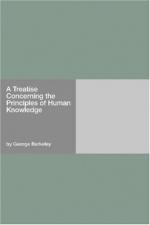74. But though it be allowed by the materialists themselves that Matter was thought of only for the sake of supporting accidents, and, the reason entirely ceasing, one might expect the mind should naturally, and without any reluctance at all, quit the belief of what was solely grounded thereon; yet the prejudice is riveted so deeply in our thoughts, that we can scarce tell how to part with it, and are therefore inclined, since the thing itself is indefensible, at least to retain the name, which we apply to I know not what abstracted and indefinite notions of being, or occasion, though without any show of reason, at least so far as I can see. For, what is there on our part, or what do we perceive, amongst all the ideas, sensations, notions which are imprinted on our minds, either by sense or reflexion, from whence may be inferred the existence of an inert, thoughtless, unperceived occasion? and, on the other hand, on the part of an All-sufficient Spirit, what can there be that should make us believe or even suspect He is directed by an inert occasion to excite ideas in our minds?
75. Absurdity of contending for the existence of matter as the occasion of ideas.—It is a very extraordinary instance of the force of prejudice, and much to be lamented, that the mind of man retains so great a fondness, against all the evidence of reason, for a stupid thoughtless somewhat, by the interposition whereof it would as it were screen itself from the Providence of God, and remove it farther off from the affairs of the world. But, though we do the utmost we can to secure the belief of Matter, though, when reason forsakes us, we endeavour to support our opinion on the bare possibility of the thing, and though we indulge ourselves in the full scope of an imagination not regulated by reason to make out that poor possibility, yet the upshot of all is, that there are certain unknown Ideas in the mind of God; for this, if anything, is all that I conceive to be meant by occasion with regard to God. And this at the bottom is no longer contending for the thing, but for the name.
76. Whether therefore there are such Ideas in the mind of God, and whether they may be called by the name Matter, I shall not dispute. But, if you stick to the notion of an unthinking substance or support of extension, motion, and other sensible qualities, then to me it is most evidently impossible there should be any such thing, since it is a plain repugnancy that those qualities should exist in or be supported by an unperceiving substance.




